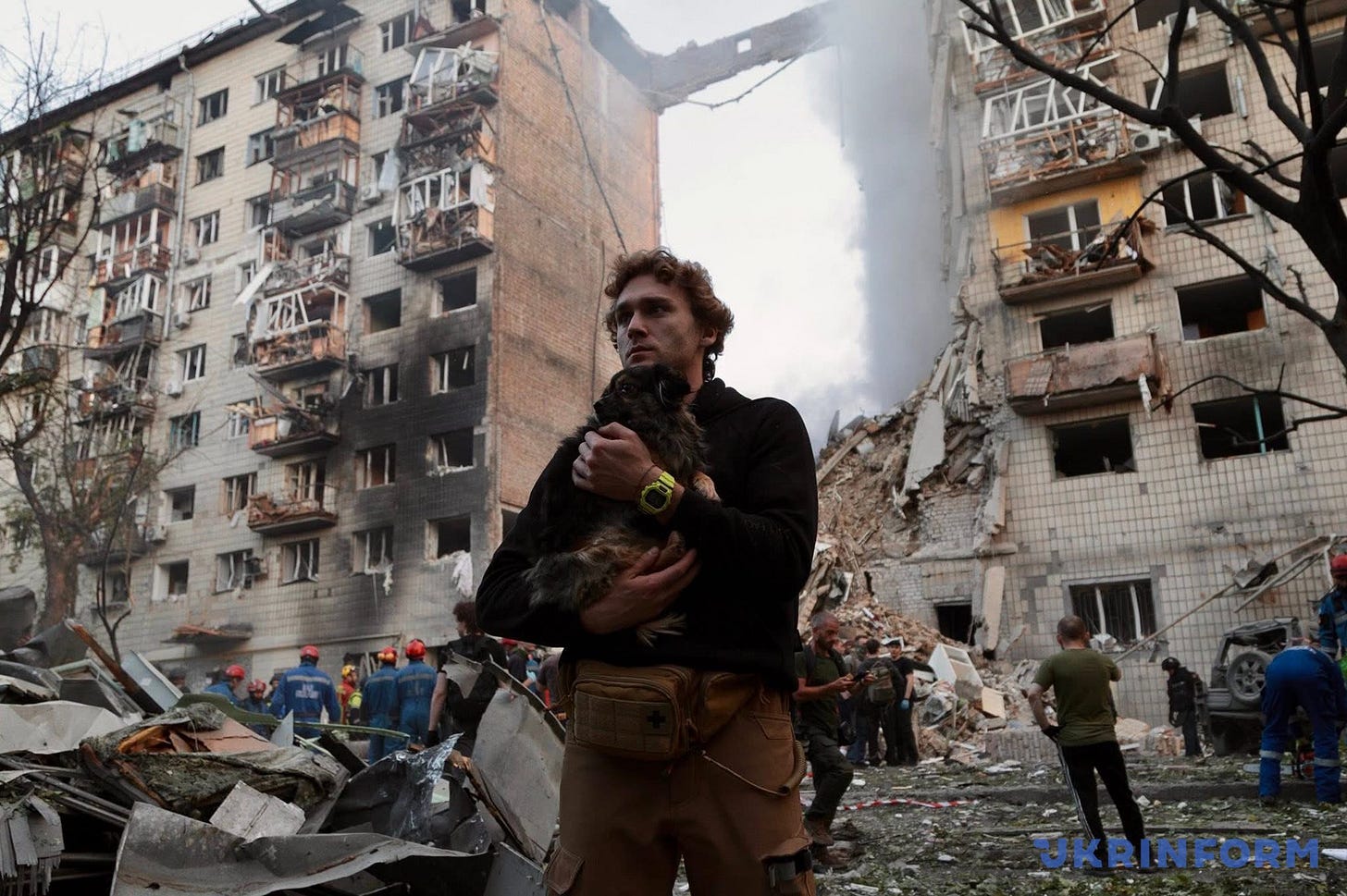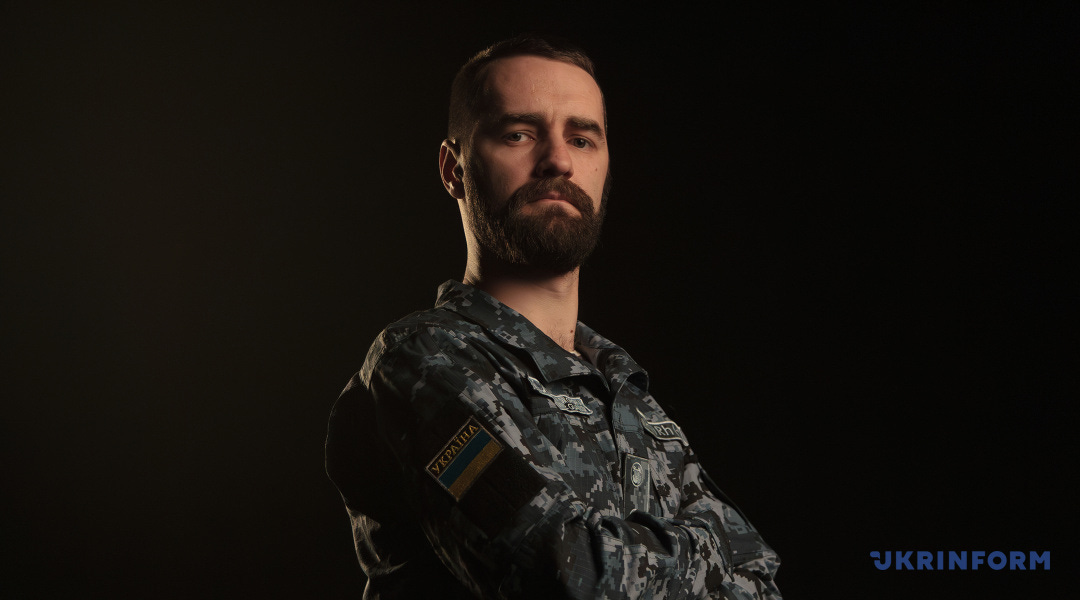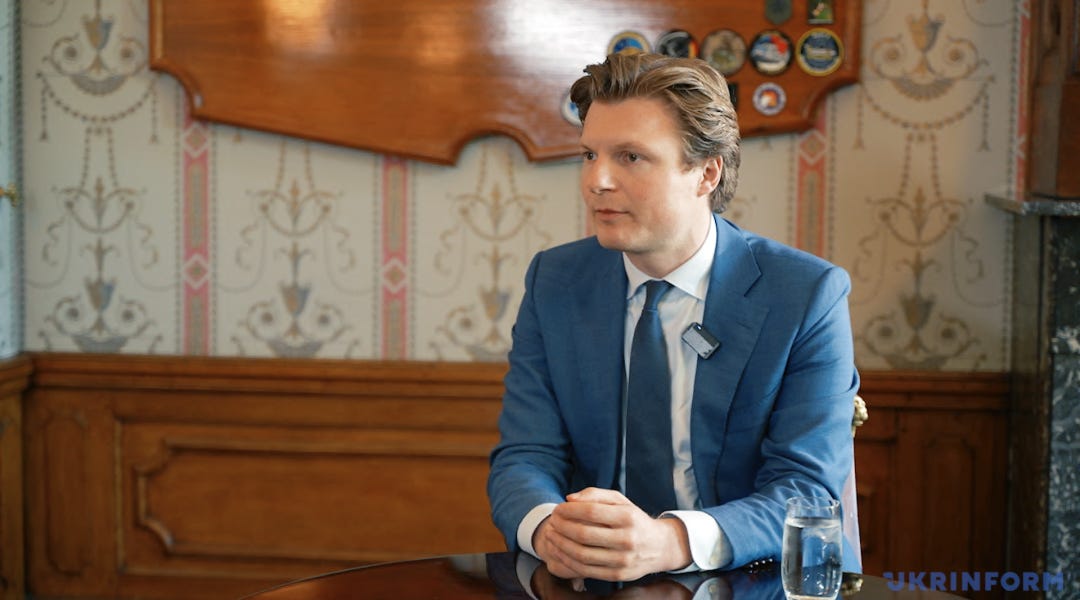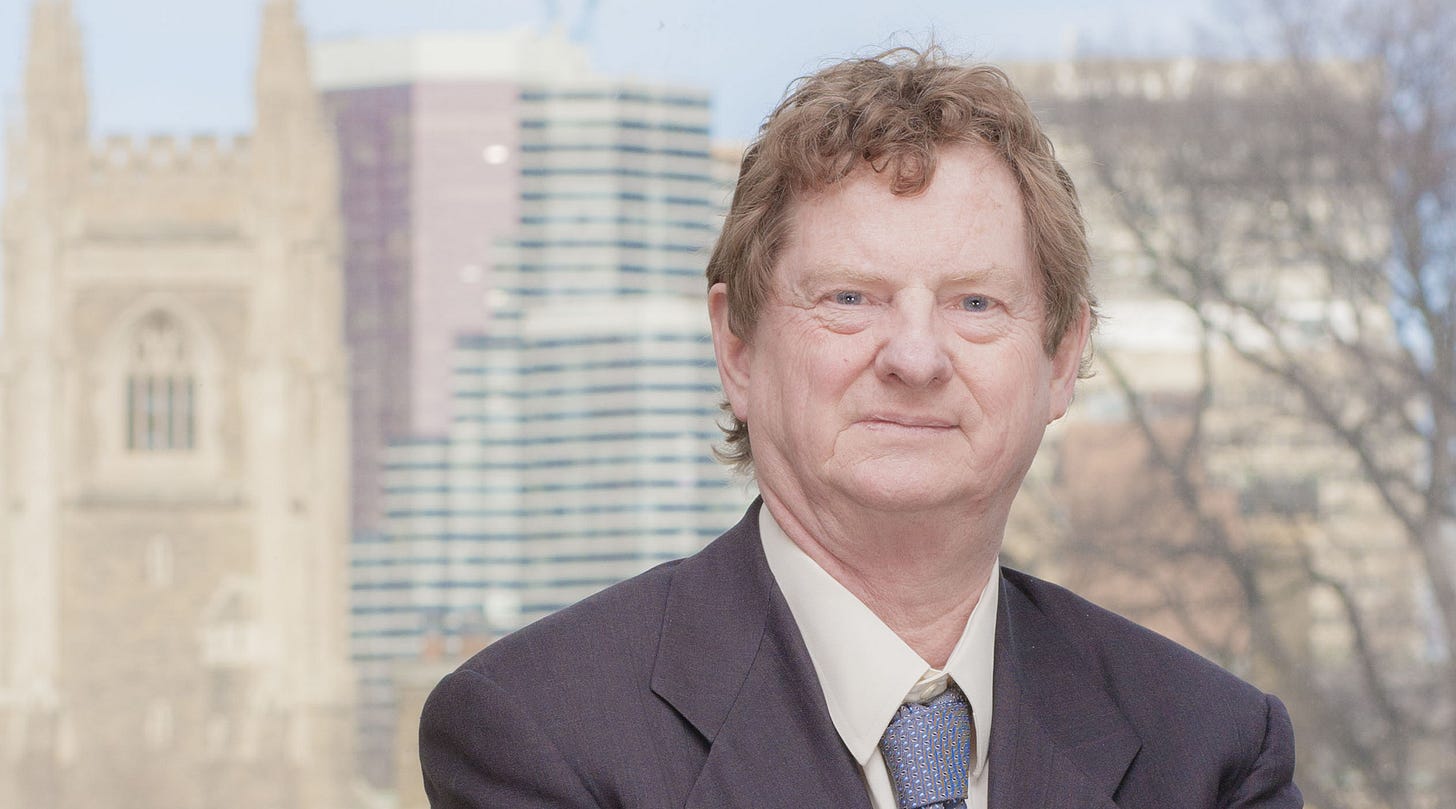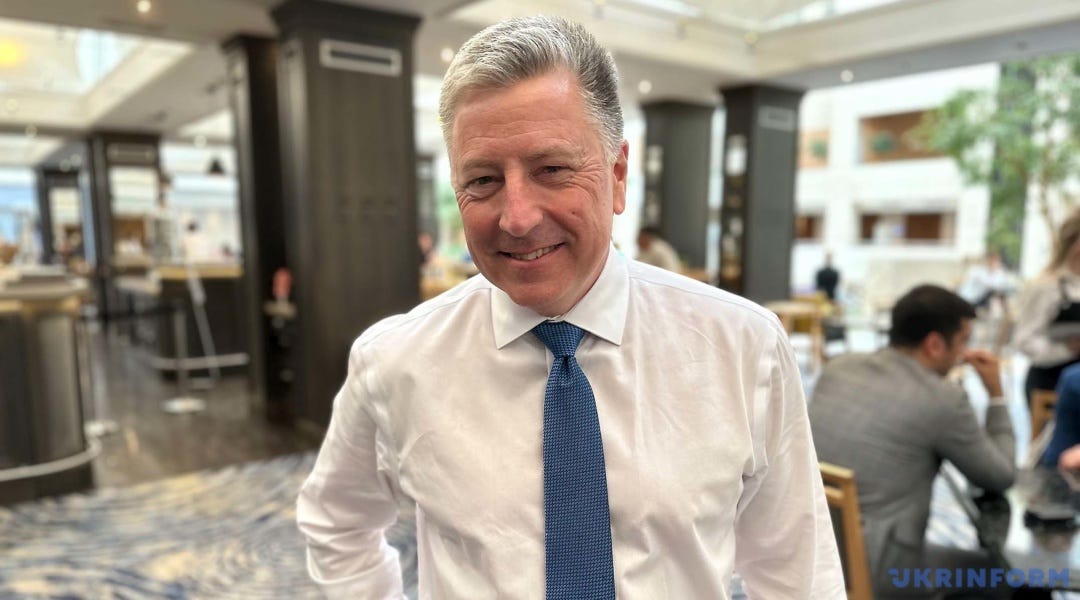Weekly Exclusives
Weekly Exclusives - a newsletter that contains author publications, interviews, exclusive comments, photos and videos.
On June 17, a Russian missile hit a residential building in Kyiv, destroying an entire unit and killing 23 people.
Kyiv: UAV hits residential building
Interview
Mykola Shcherbakov, Ship Commander, Ukraine’s Maritime Guard
How did the full-scale Russian invasion at sea begin? How was the rescue of the Ukrainian personnel deployed on the Zmiiniy (aka Snake) Island carried out in the first days of the war? What has changed fundamentally?
Mykola Shcherbakov, ship commander, Maritime Guard, the State Border Guard Service of Ukraine, began his military service in 2018 and has been defending Ukraine’s borders at sea since then. Behind his shoulders are years of experience participating in multiple combat and rescue operations, including particularly the evacuation of Ukraine’s military personnel from the Snake Island, when his ship and crew entered into direct confrontation with the Russian Black Sea Fleet flagship - the cruiser Moskva.
For this Victory Commanders series interview, Ukrinform invited Mr. Shcherbakov to discuss his service defending Ukraine’s maritime borders, what it is like working under enemy fire, the teamwork strength, and the future of the Ukrainian Navy.
Ruben Brekelmans, Minister of Defense of the Netherlands
Next week, a NATO summit will take place in The Hague. The international community is focused on security issues, support for Ukraine, and strengthening the Alliance.
One of the main topics on the summit’s agenda is enhancing Europe’s defense capabilities, including the possibility of increasing defense spending to 5% of GDP. Just last week, the Dutch government endorsed NATO’s new defense spending target precisely at 5%.
The Netherlands ranks among the leading European countries in terms of military aid to Ukraine. Key elements of this assistance include modern armored vehicles, air defense systems, F-16 fighter jets, as well as the first Patriot missile systems.
Thus, expectations for the summit, military assistance to Ukraine, and the Netherlands’ strategic initiatives were discussed with Ukrinform by Dutch Minister of Defense Ruben Brekelmans.
Nerijus Maliukevicius, Lithuanian expert on countering information and psychological operations
Nerijus Maliukevicius is a leading Lithuanian expert on countering information and psychological operations (IPSO) during times of crisis and conflict. He is the author of two books and numerous studies on combating Russian propaganda and disinformation in Lithuania. Maliukevicius is also well known for his expertise in media research in Georgia and Belarus, particularly his analysis of how the Lukashenko regime-controlled media outlets construct the "enemy image." He has participated in major international research projects, including the development of hybrid forecasting systems under the IARPA program (U.S.). In an interview with Ukrinform, he spoke about Russia's growing disinformation efforts across Europe, how the Kremlin manipulates human emotions for its operations, and what can actually stop Russian propaganda.
Dr. John J. Kirton, Director of the G7 Research Group at the University of Toronto
G7 leaders will come together this June 15-17 in Kananaskis, Alberta, Canada for the 51st Summit of the organization G7. Leaders of the world's seven largest democratic economies will discuss a wide range of issues over three days, with the establishment of a lasting and just peace in Ukraine taking center stage.
As world leaders gather in Alberta for the G7 Summit, international relations expert Dr. John J. Kirton reflects in an Ukrinform interview on the stakes of this year’s meeting, from global conflicts to climate crises and what it all means for Ukraine, Russia, and the Global South.
Kurt Volker, former U.S. Special Representative for Ukraine Negotiations
U.S. President Donald Trump is hesitant to put pressure on Russia because he still holds out hope of bringing Putin to the negotiating table. At the same time, he is increasingly frustrated that things are not going according to his plan, and may apply the "Iran scenario" to Russia.
The American leader is also frustrated with Ukrainian President Volodymyr Zelensky, yet he simultaneously admires his stance.
Ukraine is likely to continue receiving weapons from the U.S., but only on a paid basis, because Trump thinks in terms of deals. However, with Putin's mentality, no deal is possible. The only thing that could stop the war is Russia's inability to finance it; otherwise, there will never be peace with this ruler.
Until the fighting ends, Trump is not expected to visit either Kyiv or Moscow.
These were the thoughts shared by American diplomat Kurt Volker, who served as the U.S. Department of State's Special Representative for Ukraine Negotiations from 2017 to 2019, in an interview with Ukrinform.
Nico Lange, German security expert
Russia, who is currently showing no readiness for serious negotiations with Ukraine, may change its mind depending on the developments on the battlefield and the strength of pressure from the West. Among the means of pressure are tougher sanctions and the continuation and strengthening of military support for Kyiv, in particular from Germany, who is shoring up investments in weapons production projects on Ukraine’s territory. However, Europe must finally stop trusting Russian propaganda and fearing Putin, and finally support Ukraine more vigorously.
Ukrinform spoke about this with Nico Lange, a non-resident Senior Fellow with the Transatlantic Defense and Security Program at the Center for European Policy Analysis (CEPA). Nico is also a Senior Fellow at the Munich Security Conference in Berlin and Munich. He teaches at the Chair of Military History at the University of Potsdam and at the Hertie School of Governance. His research topics are the Russian war against Ukraine, new technologies in security and defense, and cyber security. Lange served as Chief of Staff at the German Ministry of Defense from 2019-2022. Prior, he was Deputy General Manager of CDU Deutschlands and State Commissioner for Innovation and Strategy in the government of Saarland. He was posted in Russia, Ukraine, and the U.S. before. Lange speaks fluent Ukrainian and Russian.
Publications
Israel-Iran war and what impact it may have on Russia’s war in Ukraine
Major issues: oil prices, Russian influence on Iran… And the “loss” of interest in the war in Ukraine is nonsense. Because it is one and the same war
What the week of Israel-Iran war has revealed
The first week of hostilities between Israel and Iran has torn away the veil of uncertainty, demonstrating a model of a new-generation military campaign. The Operation Am KE’Lavi (“Rising Lion”) is not just an act of retaliation, but a cold-blooded and methodical dismantling of the military machine that the ayatollah’s regime had been building for decades. It was not a chaotic exchange of blows, but a multipronged, meticulously planned campaign, the anatomy of which reveals the fundamental principles of modern warfare.
The Israel Defense Forces (IDF) launched a series of devastating strikes on key elements of Iran’s military and nuclear infrastructure. According to official figures, uranium enrichment facilities in Natanz and Isfahan were severely damaged, Iran’s lead nuclear scientists were eliminated, and a significant part of the command staff of the Islamic Revolutionary Guard Corps (IRGC) was taken out, and two chiefs of the General Staff were eliminated one after the other just in a matter of three days - there were no such precedents ever recorded in the history of warfare so far. Israeli forces managed to win air dominance over the western part of Iran, including Tehran, the capital city, within a matter of just a few days. This made it possible to switch from the use of expensive long-range missiles to a "carousel" tactic of direct air bombing.
Let's try and analyze the key components of the Israeli-Iranian confrontation in more detail.
Fact Checks
Russian fake news: Ukraine refuses to repatriate bodies of fallen soldiers to avoid paying compensation to their families
Russian media outlets, bots on X (formerly Twitter), and Telegram channels continue efforts to sow division in Ukrainian society amid the ongoing repatriation of fallen service members. This time, they circulated claims that Ukraine has only accepted the bodies of 1,212 defenders, allegedly because agreements were reached with their families to waive financial compensation.
As supposed "evidence," they shared a screenshot of an article from the mobile version of Deutsche Welle's website with the headline: "Ukraine has accepted the bodies of 1,212 AFU soldiers; their families have declined financial compensation."
This is fake news. Deutsche Welle has never published such a headline, as the information is completely false. The repatriation of all 6,000 defenders; bodies, agreed upon on June 2 in Istanbul, cannot be carried out all at once due to logistical constraints.
For example, a prisoner-of-war exchange involving 1,000 people from each side took place in three stages, and Russia had no complaints toward Ukraine in that case.
In addition, amid the ongoing body repatriation process, Russian information sources have been circulating a photo of a refrigerated truck bearing a Coca-Cola logo, claiming the company donated vehicles to Ukraine for transporting fallen soldiers.
This is also fake news. The image was edited using graphic software. The original photo was taken near a Renault dealership in the town of Dubno in the Rivne region. While the original image has since been deleted, photographs of another vehicle confirm the location.
Moreover, there are images online of vehicles bearing the "On the Shield" logo (a Ukrainian initiative to honor fallen soldiers), but they do not include the words "Armed Forces of Ukraine." Instead, they feature the phrase "Every fallen warrior is a hero." The logo appears not only on the truck body but also on the cabin.
These fabrications are part of a large-scale disinformation operation against Ukraine aimed at discrediting the agreement to repatriate 6,000 bodies of fallen service members. Ukraine's Center for Countering Disinformation under the National Security and Defense Council had earlier reported such a disinformation campaign related to body exchanges.
Earlier, Ukrinform reported that Russia continued to manipulate agreements concerning the exchange of fallen soldiers' remains.
Andriy Olenin
News:
War
Retired Austrian general calls Ukraine's three-year defense effort 'something between a miracle and a sensation'
U.S. General: Ukraine is teaching the world a lot
Ukraine to defeat Russia sooner than many think - Canadian expert
Netherlands Army colonel: Ukraine teaching West how to fight modern wars
Russians deploying chemical weapons nearly daily on Southern front — military
Russians pushing toward Dnipropetrovsk region
Southern front heats up: number of clashes rises by third – military
Over 1,500 victims of torture by Russians identified in Kherson region – prosecutor's office
Politics
German politician warns: SPD Russia appeasement efforts threat to Europe’s security
Korniyenko: Ukraine could join EU alongside Balkan states as part of single accession package
Support for Ukraine now core European value, says FM Sybiha
Neither Ukraine nor Israel trusts US - Hodges
Ukraine’s NATO membership best security guarantee for Europe – Estonian FM
Warsaw demands tougher 18th sanctions package on Russia amid Kyiv bombings
Society
Humanitarian demining of territories in the Kharkiv region is carried out by representatives of HALO Ukraine
HALO Ukraine is a representative office of the largest non-profit international organization, The HALO Trust, which has been clearing mines and explosive ordnance in 30 countries and territories around the world for 35 years. It is currently carrying out humanitarian demining work using various technologies in the Kharkiv region.
Deadly bus crash in France: two college lecturers from Bukovyna among victims
Laminated birth certificate not grounds to prevent child’s border crossing – Ukraine’s SBGS
Ukraine awaits Russia's response to children’s list handed over in Istanbul – Zelensky’s Office advisor
Krakow police searching for man who tore down Ukrainian flags from city buildings
Ukrainians among those to be evacuated from Israel by Poland
SSU to screen Russians and Belarusians seeking Ukrainian citizenship – MP
Parliament clarifies which categories covered by law on multiple citizenship
See you next Friday!



